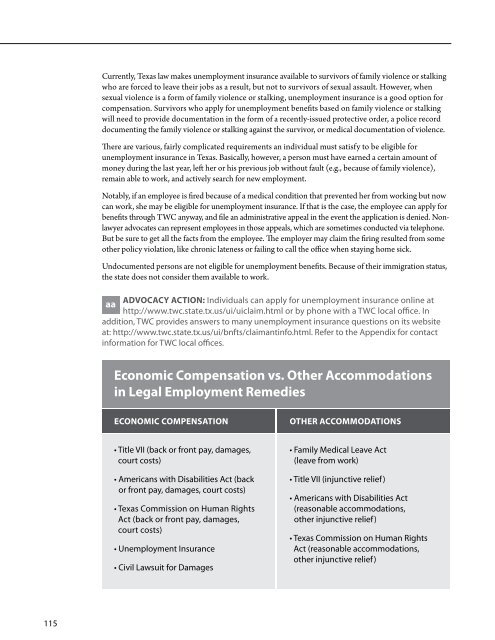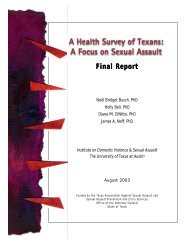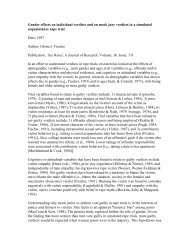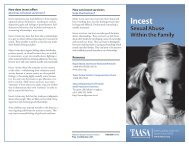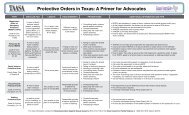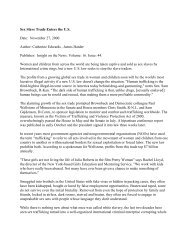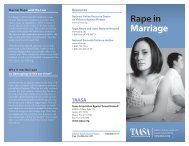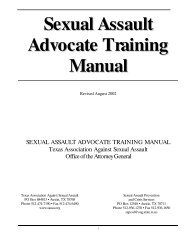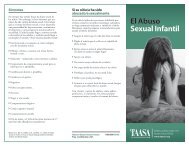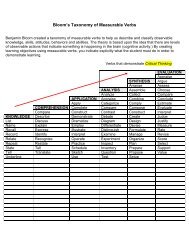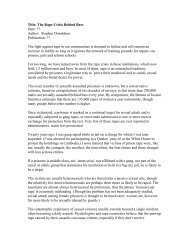Sexual aSSault LEGAL ADVOCACY MANUAL - Texas Association ...
Sexual aSSault LEGAL ADVOCACY MANUAL - Texas Association ...
Sexual aSSault LEGAL ADVOCACY MANUAL - Texas Association ...
Create successful ePaper yourself
Turn your PDF publications into a flip-book with our unique Google optimized e-Paper software.
Currently, <strong>Texas</strong> law makes unemployment insurance available to survivors of family violence or stalking<br />
who are forced to leave their jobs as a result, but not to survivors of sexual assault. However, when<br />
sexual violence is a form of family violence or stalking, unemployment insurance is a good option for<br />
compensation. Survivors who apply for unemployment benefits based on family violence or stalking<br />
will need to provide documentation in the form of a recently-issued protective order, a police record<br />
documenting the family violence or stalking against the survivor, or medical documentation of violence.<br />
There are various, fairly complicated requirements an individual must satisfy to be eligible for<br />
unemployment insurance in <strong>Texas</strong>. Basically, however, a person must have earned a certain amount of<br />
money during the last year, left her or his previous job without fault (e.g., because of family violence),<br />
remain able to work, and actively search for new employment.<br />
Notably, if an employee is fired because of a medical condition that prevented her from working but now<br />
can work, she may be eligible for unemployment insurance. If that is the case, the employee can apply for<br />
benefits through TWC anyway, and file an administrative appeal in the event the application is denied. Nonlawyer<br />
advocates can represent employees in those appeals, which are sometimes conducted via telephone.<br />
But be sure to get all the facts from the employee. The employer may claim the firing resulted from some<br />
other policy violation, like chronic lateness or failing to call the office when staying home sick.<br />
Undocumented persons are not eligible for unemployment benefits. Because of their immigration status,<br />
the state does not consider them available to work.<br />
<strong>ADVOCACY</strong> ACTION: Individuals can apply for unemployment insurance online at<br />
http://www.twc.state.tx.us/ui/uiclaim.html or by phone with a TWC local office. In<br />
addition, TWC provides answers to many unemployment insurance questions on its website<br />
at: http://www.twc.state.tx.us/ui/bnfts/claimantinfo.html. Refer to the Appendix for contact<br />
information for TWC local offices.<br />
Economic Compensation vs. Other Accommodations<br />
in Legal Employment Remedies<br />
Economic Compensation<br />
Other Accommodations<br />
• Title VII (back or front pay, damages,<br />
court costs)<br />
• Americans with Disabilities Act (back<br />
or front pay, damages, court costs)<br />
• <strong>Texas</strong> Commission on Human Rights<br />
Act (back or front pay, damages,<br />
court costs)<br />
• Unemployment Insurance<br />
• Civil Lawsuit for Damages<br />
• Family Medical Leave Act<br />
(leave from work)<br />
• Title VII (injunctive relief)<br />
• Americans with Disabilities Act<br />
(reasonable accommodations,<br />
other injunctive relief)<br />
• <strong>Texas</strong> Commission on Human Rights<br />
Act (reasonable accommodations,<br />
other injunctive relief)<br />
115


